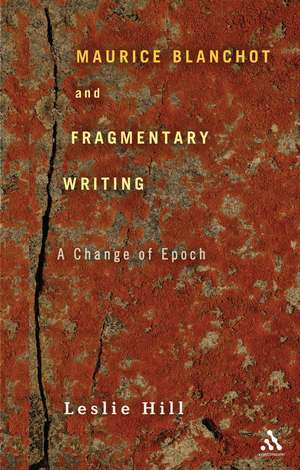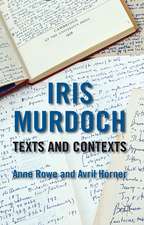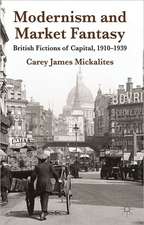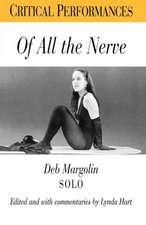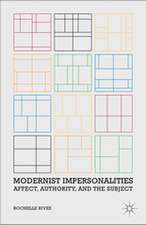Maurice Blanchot and Fragmentary Writing: A Change of Epoch
Autor Professor Leslie Hillen Limba Engleză Paperback – 5 sep 2012
Writing in fragments is often held to be one of the most distinctive signature effects of Romantic, modern, and postmodern literature. But what is the fragment, and what may be said to be its literary, philosophical, and political significance? Few writers have explored these questions with such probing radicality and rigorous tenacity as the French writer and thinker Maurice Blanchot.
For the first time in any language, this book explores in detail Blanchot's own writing in fragments in order to understand the stakes of the fragmentary within philosophical and literary modernity. It attends in detail to each of Blanchot's fragmentary works (Awaiting Forgetting, The Step Not Beyond, and The Writing of the Disaster) and reconstructs Blanchot's radical critical engagement with the philosophical and literary tradition, in particular with Hegel, Nietzsche, Heidegger, Heraclitus, Levinas, Derrida, Nancy, Mallarmé, Char, and others, and assesses Blanchot's account of politics, Jewish thought, and the Shoah, with a view to understanding the stakes of fragmentary writing in Blanchot and within philosophical and literary modernity in general.
For the first time in any language, this book explores in detail Blanchot's own writing in fragments in order to understand the stakes of the fragmentary within philosophical and literary modernity. It attends in detail to each of Blanchot's fragmentary works (Awaiting Forgetting, The Step Not Beyond, and The Writing of the Disaster) and reconstructs Blanchot's radical critical engagement with the philosophical and literary tradition, in particular with Hegel, Nietzsche, Heidegger, Heraclitus, Levinas, Derrida, Nancy, Mallarmé, Char, and others, and assesses Blanchot's account of politics, Jewish thought, and the Shoah, with a view to understanding the stakes of fragmentary writing in Blanchot and within philosophical and literary modernity in general.
| Toate formatele și edițiile | Preț | Express |
|---|---|---|
| Paperback (1) | 275.26 lei 43-57 zile | |
| Bloomsbury Publishing – 5 sep 2012 | 275.26 lei 43-57 zile | |
| Hardback (1) | 952.01 lei 43-57 zile | |
| Bloomsbury Publishing – 5 sep 2012 | 952.01 lei 43-57 zile |
Preț: 275.26 lei
Preț vechi: 313.74 lei
-12% Nou
Puncte Express: 413
Preț estimativ în valută:
52.68€ • 54.79$ • 43.49£
52.68€ • 54.79$ • 43.49£
Carte tipărită la comandă
Livrare economică 14-28 aprilie
Preluare comenzi: 021 569.72.76
Specificații
ISBN-13: 9781441166227
ISBN-10: 144116622X
Pagini: 400
Dimensiuni: 138 x 216 x 30 mm
Greutate: 0.59 kg
Ediția:New.
Editura: Bloomsbury Publishing
Colecția Continuum
Locul publicării:New York, United States
ISBN-10: 144116622X
Pagini: 400
Dimensiuni: 138 x 216 x 30 mm
Greutate: 0.59 kg
Ediția:New.
Editura: Bloomsbury Publishing
Colecția Continuum
Locul publicării:New York, United States
Caracteristici
The first authoritative analysis of Blanchotâ?Ts influential but still widely misunderstood fragmentary texts
Notă biografică
Leslie Hill is Professor of French Studies at the University of Warwick, UK. He is the author of Beckett's Fiction: In Different Words (Cambridge University Press, 1990), Marguerite Duras: Apocalyptic Desires (Routledge, 1993), Blanchot: Extreme Contemporary (Routledge, 1997), Bataille, Klossowski, Blanchot: Writing at the Limit (Oxford University Press, 2001) The Cambridge Introduction to Jacques Derrida (Cambridge University Press, 2007) and Radical Indecision: Barthes, Blanchot, Derrida, and the Future of Criticism (Notre Dame University Press, 2010). He is also the co-editor of After Blanchot: Literature, Philosophy, Criticism (University of Delaware Press, 2005).
Cuprins
Chapter One: A Turning
1. A spectre
2. Writing the future
3. From fragment to fragmentary
4. The limits of nihilism
5. Radical suspension
Chapter Two: The Demand of the Fragmentary
1. A gift
2. A double voice
3. Presence without present
Chapter Three: An Interruption
Chapter Four: Writing - Disaster
1. What is called disaster?
2. Another epoch
3. What happened
4. The youngest day
Chapter Five: A Change of Epoch
Bibliography
Index
1. A spectre
2. Writing the future
3. From fragment to fragmentary
4. The limits of nihilism
5. Radical suspension
Chapter Two: The Demand of the Fragmentary
1. A gift
2. A double voice
3. Presence without present
Chapter Three: An Interruption
1. From threshold to threshold
2. A step further
3. The law of return
4. Voice without voice
5. A politics of the fragmentary
6. Burying the dead
2. A step further
3. The law of return
4. Voice without voice
5. A politics of the fragmentary
6. Burying the dead
Chapter Four: Writing - Disaster
1. What is called disaster?
2. Another epoch
3. What happened
4. The youngest day
Chapter Five: A Change of Epoch
Bibliography
Index
Recenzii
"Maurice Blanchot and Fragmentary Writing is a remarkable study of the most extraordinary and enduring literary figure in twentieth-century France. An acknowledged authority on Blanchot and his peers, Leslie Hill guides the reader through some of the most difficult and exciting writing produced after the Second World War: his remarks on the imbrications of literature and philosophy are never less than illuminating. Any new book by Leslie Hill is an event in French Studies, and this one is no exception." -- Kevin Hart, Edwin B. Kyle Professor of Christian Studies in the Department of Religious Studies, University of Virginia, USA
"What are fragments? Chips, flecks, scraps, orts, bits, grinds, clasts, shards, sherds, slivers, splinters, crumbs... a potentially infinite list, which is the point made by Leslie Hill's subtle and forceful meditation on Blanchot's practice of the literary fragment. Such pulverulence contaminates everything, every whole comes undone until we face a more open future since it, too, is fragmentary." -Jean-Michel Rabaté, Vartan Gregorian Professor in the Humanities at the University of Pennsylvania
Summarized.
In his recent book, Maurice Blanchot and Fragmentary Writing, Hill argues convincingly that the fragmentary indicates an ethico-political exigency in Blanchot's writing that is all too often overlooked by his critics and neglected by historians of modern literature. Hill frames his readings of Blanchot around the view that the fragment does not simply designate a missing piece of the whole, which must be recovered or restored. On the contrary, it ruins the logic of completion that is elsewhere held to unify the work of literature.
"What are fragments? Chips, flecks, scraps, orts, bits, grinds, clasts, shards, sherds, slivers, splinters, crumbs... a potentially infinite list, which is the point made by Leslie Hill's subtle and forceful meditation on Blanchot's practice of the literary fragment. Such pulverulence contaminates everything, every whole comes undone until we face a more open future since it, too, is fragmentary." -Jean-Michel Rabaté, Vartan Gregorian Professor in the Humanities at the University of Pennsylvania
Summarized.
In his recent book, Maurice Blanchot and Fragmentary Writing, Hill argues convincingly that the fragmentary indicates an ethico-political exigency in Blanchot's writing that is all too often overlooked by his critics and neglected by historians of modern literature. Hill frames his readings of Blanchot around the view that the fragment does not simply designate a missing piece of the whole, which must be recovered or restored. On the contrary, it ruins the logic of completion that is elsewhere held to unify the work of literature.
Descriere
The first book to provide a detailed account of fragmentary writing in the work of the French novelist, critic, and thinker Maurice Blanchot (1907-2003).
